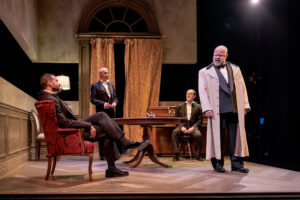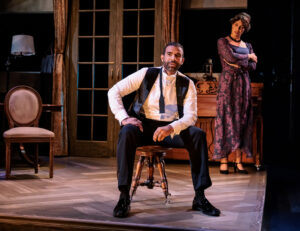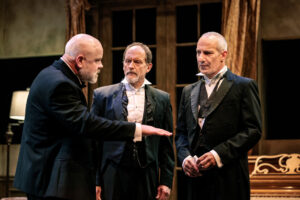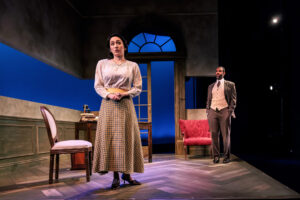Waste
Harley Granville-Barker
Adapted by Carey Perloff
Marin Theatre

“Oh what practical, sentimental children you men are, you and your consciousness, you and your laws. You drive us to distraction and sometimes death by your stupidities. Poor women!”
Is it any wonder that in an England with its toes still in the deeply moralistic waters of the recently past Victorian Age that lines like these led to Harley Granville-Barker’s 1907 play, Waste, being quickly banned by Lord Chamberlain’s government? But the wonder truly is that a century-plus later, this same condemnation could be laid at the feet of today’s Washington conservatives and of the Supreme Court’s majority, especially when it comes to their views, laws, and rulings in regard to women’s reproductive rights.
Understanding the current relevance of Granville-Barker’s original intent and message, Marin Theatre opens a riveting, exceptionally acted Waste that Carey Perloff has adapted and directed with a keen eye for retaining the original Edwardian English setting, politics, and manners while ensuring that what we often hear, see, and feel the U.S.A. of 2025.

Liberal Henry Trebell is so driven to disjoin the Church of England from the Statehood of England that he has offered himself to the opposing conservative Tories as a cabinet member in Lord Horsham’s incoming administration. The Tories and Trebell want to strip the Church of its government funding through a Disestablishment Bill, with Trebell building a case for the captured money to be used to establish a country-wide network of secular schools and colleges.
Trebell’s comet-rising career is suddenly in dire jeopardy after a night of ecstasy with a married woman that results in a pregnancy and with her then seeking a illegal, ill-fated abortion from a back-alley doctor. The subsequent debate among Trebell’s future cabinet mates is one full of political manipulations and cynical calculations and completely absent of any sympathy or outrage for the woman (or women in general).

Marin Theatre’s Artistic Director, Lance Gardner, returns after a five-year absence to the stage to take on the role of bold-speaking brusque-mannered, and cold-hearted Henry Trebell who proves time and again that he values his ideals and ideas much more than any individual he meets, including Amy O’Connell who now carries the child half his. Lance Gardner’s on-stage presence is often bigger than life as his Henry perpetually speaks as if he is standing behind a podium giving a speech, a kind of English version of Teddy Roosevelt on his bully pulpit. His confidence in his own views is quite unbounded. His capacity for emotions and feelings beyond the passion for his own plans are near nil. He himself assesses, “I only have a rational mind.”

But for a few moments, he meets his match in the opening scenes as he and Amy O’Connell play a fascinating, sensual cat-and-mouse game of flirting that is peppered with back-and-forth digs and jabs. Liz Sklar quickly asserts and proves Amy O’Connell’s strength as a dueling partner, moving in with determination to win that first kiss. But when her Amy returns in three months to reveal to Henry her pregnancy, Liz Sklar is arresting in portraying a fortitude of character which her Amy has even as she is extremely shaken and emotionally vulnerable, given the unwanted, illicit pregnancy.
As Amy presses Henry to ascertain what feelings for her he had that first night and/or has now, it becomes clear he has none for her but only for the child in her womb. With that, she outrightly rejects his demand that she deliver the child, saying, “There is no child because I haven’t chosen that there shall be.” Further, she looks Henry directly in the eyes with her own cold stare to say, “What do woman’s rights come to if that’s not their right [to make such a decision}?” For 1907, that was a question no woman was allowed to think, much less ask aloud. In 2025, it increasingly is just as forbidden in more and more parts of our own country.
Amy O’Connell decides to follow through with her declaration that “there is no child” and seeks the only solution open to her — one that is still the sole solution many women feel they have in nineteen of our own country’s states. Her and the child’s fates and the revelation that Trebell is the father sets off a panicky, self-preservation-infused debate among the soon-to-be-installed Prime Minister and his to-be cabinet.

Daniel Cantor’s face twists and turns into all sorts of wrinkles and squints as his Lord Horsham, England’s incoming Prime Minister, hems and haws trying to decide how to and if to rescue/retain Trebell while also trying to appease the others of his proposed cabinet. Charles Cantelupe is a both a leader in the Church as well as a needed slot for the Cabinet with Anthony Fusco masterfully mixing piety, practicality, and power-seeking into one personality.
While Cantalupe is appalled by Trebell’s immortal sin, he increasingly sees him as the only way for the Disestablishment Bill to succeed, something Russell Blackborough from the Midlands (think our own Midwest) is much less inclined to accept. Mike Ryan is the bombastic, oft-blasting Blackborough who distrusts Trebell to no end because “you are a man of ideas and a man of ideas is a grave embarrassment for a government.” The back-and-forth, ego-fueled, male-as-superior debates of this group — including Trebell himself — becomes a major portion of the play’s post-intermission action, bogging down a bit the otherwise tight and tense momentum of the rest of the play.

Intertwined with this group in its deliberations is Dr. Wedgecroft who appears to be Trebell’s only true friend in the world. Jomar Tagatac’s doctor is on the outside a measured mediator and a trusted counselor; but when it comes to women — especially the one whom he quickly blames for all Trebell’s troubles — he turns quite cynical, accusatory, and vicious: “My God, women are such fools! …Look at the decent doctors they simply turn into charlatans.” Of Amy, he refers as “the poor little liar.” Tagatac rises to a high level as a skilled actor to reflect and expose the low, despicable level all these men sink in their opinions of women in general.
No better in that category is Amy O’Connell’s Irish husband, Justin, who arrives in the midst of the debating as the politicians try to persuade him to lie in an upcoming inquisition about the fatherhood of his wife’s child. Joseph O’Malley leaves his impressionable mark in his dual roles as both the highly loyal, puppy-like and excitable undersecretary to Trebell, Walter Kent, and the totally opposite in character husband of Amy, Justin O’Connell.
As the latter, O’Malley openly and even proudly displays his sarcastic disregard of the politicians gathered around him and his complete indifference of their roles in governance. Where he is in agreement is in their unconcern for what has happened to his wife (“She was a worthless woman”). He is in also clear alignment with them on attitudes toward women in general. (“What are men to do when this is how women use the freedom we have given them.”)

Against these men, both the playwright and the adapter make it clear, however, that it is the female sex that is superior in almost every regard. Not only is Liz Sklar’s Amy O’Connell a modern day woman in her belief about women’s rights and in her own determination to be in charge of her own life (no matter the cost), the other women of the play are also noteworthy in their own sense of self-knowledge and expressed confidence. Anna Takayo is Walter Kent’s fiancee, Lucy Davenport, who holds her own in conversation with the chauvinistic Trebell. She calls out his game of being “hard on women,” asserts to his bemused smirk that “I think I’m as clever as most men I meet,” and makes it clear that her upcoming marriage will be a “partnership” — all of which in 1907 must have been even more reasons Waste was banned from performance.

As she is so wont to do on Bay Area stages, Leontyne Mbele-Mbong knocks it out of the park in her role as Henry Trebell’s sister, Frances. The dignity, emotional breadth, and sense of both intuitive and intellectual depth displayed are stunning. And while she has given up a career of teaching to aid in the career of her brother, her Frances is not one to be subservient to any man, including the brother she so clearly and deeply loves. That latter evaluation evolves less from the script and more from the actor’s prowess and stance as so ably directed by Perloff.

Arnel Sancianco has created a visually striking set of a cubed room with much access and openness inside an otherwise empty stage — all enhanced so beautifully by the mixture of dark hues and streaming whites of Kate Boyd’s gorgeous lighting design. Maggie Whittaker has captured the early 20th-century era and all the societal and political positions represented with her impressive array of costumes. Dialects both English and Irish have airs of authenticity in the many types of voices often booming them through the coaching of Christine Adaire.
The title of Granville-Barker’s provocative, Edwardian masterpiece speaks to so many aspects of the play. Noble ideas and their worthy possibilities, the potential for women’s contributions in an otherwise male-dominated world, the very lives of Amy O’Connell and of Henry Trebell — all become just Waste in the conservative, male-dominated political world around them. While historically so interesting to behold, Waste in the hands of Carey Perloff and Marin Theatre is such an important mirror to remind us of the stakes of so many of the debates, legal battles, court rulings, and passed legislation of our own times.
Rating: 4.5 E
A Theatre Eddys Best Bet Production
Waste continues through March 2, 2025, in a two-hour, fifteen-minute production (one intermission) by Marin Theatre, 397 Miller Avenue, Mill Valley, CA. Tickets are available www.marintheatre.org or by calling 415-388-5208.
Photo Credit: Chris Hardy
